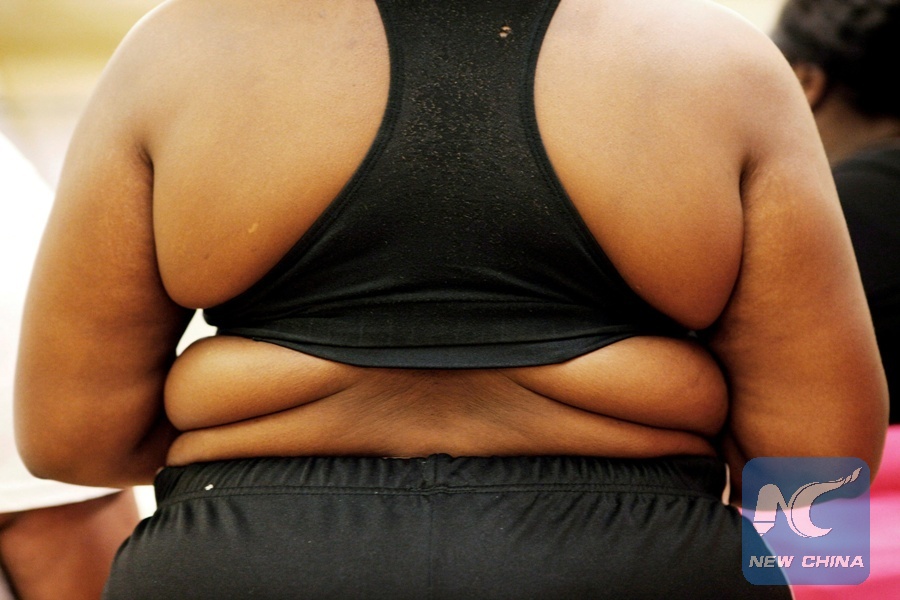
A competitor prepares to go in front of judges at a casting call for the second season of the reality television programme "Dance Your Ass Off," during which overweight or obese contestants hope to lose weight by dancing, in New York City, U.S. Dec. 18, 2009. (Xinhua/REUTERS)
WASHINGTON, April 3 (Xinhua) -- A new research revealed the molecular mechanism of why people should not be nervous overnight if they don't want to gain weight.
The study, published on Tuesday in the journal Cell Metabolism, has found that the fat cell growth caused by chronic stress or disrupted circadian rhythms is linked to the timing of the dips and rises of a class of hormones called glucocorticoids, predominantly the "stress hormone" cortisol.
The findings suggest new strategies to reduce weight gain by controlling the timing of hormonal pulses, according to Mary Teruel, assistant professor of chemical and systems biology and senior author of the study.
HORMONE LEVEL LINKED TO STRESS
Fat cells normally turn over at a rate of 10 percent per year. They die and are replaced by newly differentiated fat cells.
Researchers have long known that glucocorticoids trigger precursor cells to convert to fat cells, and that the fat tissue contains a huge excess of precursor cells that could convert, given the right signals.
A healthy person's level of glucocorticoids rises and falls in a circadian 24-hour cycle, peaking around 8 a.m., dropping to its lowest around 3 a.m. the next day, and then rising back to its peak about five hours later.
The rise is a wake-up signal that gets us moving and turns on our appetites. Under healthy conditions, less than 1 percent of a person's precursor fat cells are converting into fat cells.
But the glucocorticoid levels in our bloodstream are also increased by stress, short spikes are induced by short-term stress, such as exercise, and sustained levels are caused by chronic stress.
DO NOT WORRY AT NIGHT
To the puzzlement to Teruel's team, the morning high hormone level and short-term stresses resulting from exercises do not cause obesity, but losing the normal rhythm of glucocorticoid secretion, such as in conditions of chronic stress, jetlag and sleep disruption in shift-workers, does.
They bathed the petri-dish-grown precursor fat cells to glucocorticoids in carefully timed pulses in an experiment and found that one pulse of glucocorticoids lasting 48 hours led most of the cells to differentiate, while shorter pulses with at least 12 hours between them resulted in minimal differentiation.
To uncover how the precursors are able to sense the duration of the hormonal pulses and filter out short pulses, the researchers used single-cell live imaging to track the level of a protein called PPAR-gamma in thousands of individual cells over several days while the precursors became fat cells.
PPAR-gamma is a protein that correlates with the fat cell's maturity. When PPAR-gamma levels increase to a certain threshold level in a fat precursor cell, the precursor cell will convert into a fat cell.
The researchers' experiments and computer modeling indicated that the system must rely on two types of positive feedback (fast and slow) to enable precursor cells to ignore the normal rise and fall of glucocorticoids and short daytime pulses, but respond to long pulses.
They have found a protein called CEBP-alpha that provides fast positive feedback to PPAR-gamma and a protein called FABP4 serving as a key slow positive-feedback regulator of PPAR-gamma.
In this feedback loop lasting 34 hours, PPAR-gamma activates FABP4, which in return activates PPAR-gamma. This process allows PPAR-gamma to continue to build up in response to long pulses, according to the study.
REGULAR LIFE MAKES YOU SLIM
In a 21-day study in mice, the researchers found that loss of the normal circadian rhythm for glucocorticoids led to a doubling of the animals' fat mass.
They also found that no increase in fat occurred as long as they boosted glucocorticoids, delivered by injection, only during the normal circadian peak times, even if they increased peak glucocorticoid levels fortyfold.
"It suggests ways in which such treatments can be given safely without the common side effects of weight gain and bone loss," Teruel said.
The research has implications for controlling weight gain in humans, Teruel said.
"The timing of your stress does matter," she said. "Our results suggest that even if you get significantly stressed or treat your rheumatoid arthritis with glucocorticoids, you won't gain weight, as long as stress or glucocorticoid treatment happens only during the day."
"But if you experience chronic, continuous stress or take glucocorticoids at night, the resulting loss of normal circadian glucocorticoid oscillations will result in significant weight gain," Teruel said.

